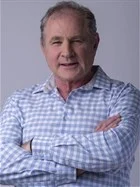
Top stories





Marketing & MediaAds are coming to AI. Does that really have to be such a bad thing?
Ilayaraja Subramanian 1 day

More news















Daniel Kahneman and Amos Tversky's Prospect Theory demonstrates that we have an irrational tendency to gamble with profits and play it safe with losses. In other words, the R100 we would need to pay a gardener would be a loss, so we mow the lawn ourselves (play it safe). However, mowing the lawn for the neighbour would be a gain, but we give this opportunity no second thought (play it 'unsafe').
If we plotted happiness on a graph, we'd expect it to look something like this for gaining or losing money:

If you won R100, you should be happy, say, 10 units - and if you lost R100 you should be happy by minus 10 units (or unhappy 10 units). But as Jimmy Connors says: "I hate losing more than I love winning." He's absolutely correct. Prospect Theory shows a curve that follows more of an 'S' shape, with the loss (lower) part of the curve being a lot steeper (more pain for the same money).

What the above shows is that the loss of R100 hurts a lot more than the gain of the same amount, which illustrates the motivation of Prospect Theory: people are risk-averse when they frame the outcome as a potential gain, and take more risk when they see the result as having more potential for loss.
In other words, I would be hesitant to place another chip on the roulette table with my winnings, but if I've already lost R100, it's not that much more painful to lose R200. Perhaps this is why gamblers tend to throw away their life savings with a somewhat deadpan expression - it only hurts big on the initial loss.
When women are told they could lose a breast, they are more likely to go for a mammogram than if they were told the amazing benefits of early detection. Perhaps it's the fearful image, but even when a somewhat neutral phraseology is used (but still phrased as a loss), the results are equally effective:
Check for breast cancer: you can lose several potential health benefits by failing to spend only five minutes each month doing breast self-examination.
Also, homeowners, when told how much money they can lose from inadequate insulation, are more likely to insulate their homes than those told how much money they could save.
Because we have an irrational tendency to gamble with losses as opposed to profits, we don't hesitate to hold onto shares that are turning into dogs, and cash in on those performing well. Just the opposite of what we should do.
Medical Aids start you off on a Blue status, spurring you on to the target of getting to Gold - to a world of cheap airline tickets, discounted movie tickets and a free gym bag. However, if they started you on Gold - and if you lost points for every gym session you never attended, the gyms would be packed. But they don't. So it's not. That's Prospect Theory for you.
Reference : Schwartz B. The Paradox of Choice. Why more is less. HarperCollins 2004.
